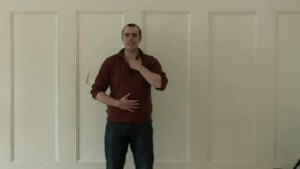
Most of the practice tips on this blog are about setting good practice habits in motion, but bad habits, like poor breathing, need to be disrupted too. The tools you use to disrupt bad habits are the same ones you use to create good practice habits:
- Make the "when" and "how" of your practice highly contextual: "On Tuesday, I will practice for 15 minutes between meetings in my office, so that I can feel more energized as I head into the afternoon."
- Focus on small chunks of skill: "As I do my qigong form, I will focus on how the weight-shifting connects my feet to the floor."
- Finally, leave yourself wanting more. If you always finish a practice session feeling like you're not burnt out, but actually a little bit hungry for more practice, you're going to crave your next practice session.
Over time, you create a practice snowball, where the little doses of highly contextual practice add up to a greater inner drive to practice, more practice stamina, and the ability to focus on meaningful aspects of your practice. This is the best path to acquiring new skills.
Relaxation is Not Necessarily Skill Acquisition
I never really liked hearing people say they want to "fight stress". Stress is fighting by definition! And thinking about "getting really good at relaxing" seems equally paradoxical to me. I think there is value to relaxation techniques, of course, and many of them are embedded in the deep breathing exercises I teach as part of qigong and tai chi. It's just that it's not so much about increasing your lung capacity, learning diaphragmatic breathing as a skill, or even specific exercises for anxiety, as it is about disrupting the stress cycle.
The distinction here is that your are not "doing more relaxation", you are breaking up "doing more stress" so that the effects of stress and anxiety can't build up in your nervous system. Think of it like a snowball, as it rolls downhill, it gets bigger and bigger, right? Well, by taking conscious breathing exercise breaks, you break up the hill, so the snowball can't build up. I'm not saying it's never going to snow again, it's just that you won't experience the accumulation. Here's how to disrupt the stress cycle with the same three techniques that we use to create good practice habits:
- Make the "when" and "how" of your stress highly contextual. Once you understand where the spikes are in your day, you can intervene and add breathing exercises to re-balance or keep the snowball from building.
- Focus on small chunks of skill. When you learn a set of breathing exercises, each exercise should serve a purpose. It's always effective to focus a small number of skills, 1-3, in each practice session.
- Finally, leave yourself wanting more. This piece gets really interesting in a stress-cycle-breaking session. You want to explore the barrier between your practice and your return to your day. Notice when thoughts of outside pressures start to creep back into your head during the practice session. That's fine and natural, but the key is to learn how to transition back into your day as smoothly as possible.
Posture, Stress, and Breathing Exercises
As a tai chi teacher, one facet of stress that I think gets overlooked is the role that posture and (lack of) movement play in reinforcing the stress cycle. The good news is that when you begin to work on your breathing, you are already working on your posture, and as that work carries over into your non-practice time, you will continue to see the benefits. Here's a short clip on how good diaphragmatic breathing works:
In order for the diaphragm to move properly, you must maintain a "long spine". Good spinal length allows the movement of the diaphragm to pull on ligaments connected to the internal organs and the spine and gentle massage and tone everything in the torso. Not only does diaphragmatic breathing create better air exchange, deep breathing exercises also contribute to the health of the internal organs, like you were giving yourself a massage.
It's a reinforcing cycle: good posture lets the breathing mechanism work better, you get better air exchange and your body handles stress better. As stress has less of an impact, your body is in "fight or flight mode" (the opposite of good posture -- the fetal curl) less often, and it becomes easier to breathe well.
Takeaways for Your Home Practice
If you want to make a lasting impact on your health and sense of well-being, setting out to break your stress cycle is very important. Remember these tips:
- Explore the context of stress spikes in your day.
- Break the snowball effect with breathing breaks.
- Re-balance your internal environment and ability to handle stress by learning about posture and doing breathing exercises.
- If you want to go further into relaxation, start building a daily practice like standing meditation or tai chi (remember, it's the daily cycle that's powerful, not any one practice session).

Share this post
Twitter
Google+
Facebook
Reddit
LinkedIn
StumbleUpon
Pinterest
Email